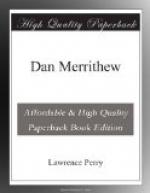“It is always well, Captain, to divine the trend of the wind before weather vanes give information to all who care to look for it.”
“Yes?” replied Dan, not comprehending.
“Yes. Those playthings, strategically placed at the capital, will insure an era of Government integrity for some time to come; and that will be very good; for the kind of integrity existing there is much to my liking. Vasquez is restless; Sanches is uneasy; but there will be no radical action for some time to come. When it does—well, Captain, I have taken the liberty to store some pieces of ordnance below—they appear as household furniture in the manifest of cargo. I consider them qualified to maintain all sorts of Government integrity.”
“No doubt,” smiled Dan; “if you have any one down there to handle them.”
“I have a very large office staff in Domingo City, unusually large. I did not hire the men for their penmanship, nor for their ability as clerks, either.” Here Mr. Howland raised his eyebrows slightly, and Dan, taking his cue, raised his eyebrows too.
And so the Tampico sailed peacefully south-ward. The April sun softened the air, the sea was like glass, and by the time the steamship had picked up the Southern Cross, the little company had been tried in the balance of propinquity and found not wanting.
It was brilliant moonlight, and eight bells chimed sweetly over the silvery waters from the forecastle head, as Dan, with a cheery good evening, followed the first mate to the bridge. The second mate smiled genially, gave the course as south half east, and, with his dog-watch ended, went to bed. A gruff voice rolled along the deck.
“The watch is aft, sir!”
Dan’s voice hurled astern before the echoes died.
“All right. Relieve the wheel—and the lookout!”
Virginia, addressing a merry group on the hurricane deck, just below and aft the bridge, paused in the middle of a sentence and listened to the sharp, crisp words. Then she smiled slightly and resumed her discourse.
Dan paced up and down with the mate, taking up the thread of the talk where it had been left the previous watch; but neither was in a talking mood, and they soon fell silent. Presently a girl’s rich voice rose to the accompaniment of Oddington’s banjo, an instrument but poorly adapted to the motif of the music, which was plaintive, yearning. The deep contralto notes brought full meed of meaning, although the words were German; low, deep, uncertain at first—the ponderings of love, of devotion, of doubt—then swelling loud and full and free at the end; love justified, undying, triumphant, overpowering.
“Koennt’ fuehlen je das Glueck
das ich wuerd nennen mein
Haett’ ich nur Dich allein!
Haett’ ich nur Dich, nur Dich allein!”
Then suddenly in wild rapture she broke from the German, repeating the refrain in English—




